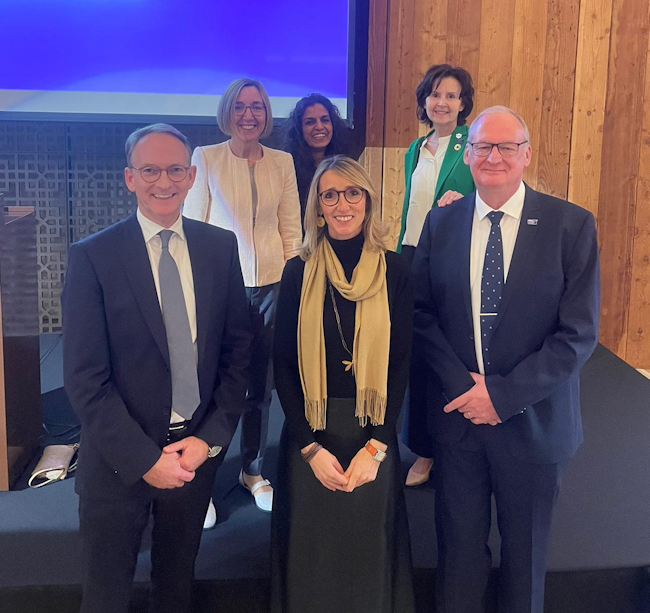The Plastics Industry supports a robust and effective Global Plastics Treaty to end plastic pollution
In March 2022, 200 countries came together at the UN Environment Assembly to tackle one of today’s toughest environmental crises: plastic pollution. Countries committed to forging a legally binding instrument—the UN Global Plastics Treaty—to tackle the issue and the plastics industry, BASF and LYB amongst them, continues to support this.
As the final negotiations will take place in Korea later this month, the world stands at a pivotal crossroad: seize this opportunity to build a sustainable future or hand the challenge of plastic waste to the next generation.
At the heart of this treaty is the principle of circularity — a system where products are designed for reuse or recycling and at the end of life are collected and remade. This would help prevent pollution and conserve natural resources, while also continuing to deliver the socio-economic benefits of plastics to a growing global population.
Strict government-imposed limits on plastic production or the removal of certain chemicals from use would slow down the benefits that plastics bring for health, clean water, infrastructure and the energy transition.
The treaty must help prevent high-leakage plastic applications from becoming pollution through tailor-made sectorial policies. By implementing this locally, we respect countries’ ability to determine what their society deems valuable based on their circumstances or culture.
We can consistently identify products that need to be improved in a risk-based way, while considering their positive impact on society, the environment and the economy.
A recent study in Nature found unmanaged waste is the leading cause of plastic pollution. A consequence of the 2.7 billion people that lack basic waste collection services. Industry, stakeholders, and governments must collaborate, using expertise and innovation to scale up recycling efforts and build the right policy environment for such solutions to scale.
Significant financial investments are necessary to tackle the plastic waste issue at the source. One proven approach to achieving this is through Extended Producer Responsibility (EPR), which creates self-sustaining waste management systems that improve waste collection and promote recycling and recovery by giving value to used plastics. Producers pay into a fund for waste management infrastructure, with fees based on whether products are recycled or sent to landfills.
In Germany, EPR is driving a plastics recycling rate seven times the global average. In the Philippines, EPR helped remove nearly 500,000 tons of plastic waste last year. While these success stories illustrate the potential of EPR, it is important to ask: can every country replicate these successes?
While it is feasible to implement EPR principles globally, we must recognize that countries face different challenges in managing plastic waste. This reality underscores the need for tailored solutions that empower governments to develop national action plans which fit local conditions and contain common elements that incentivize change such as deposit schemes, recycling rate targets that increase over time or mandatory recycled content targets.
The success of measures like these hinges on clear rules for calculating these targets, providing the certainty needed for investment decisions. Clear guidelines not only facilitate domestic recycling efforts but also highlight the importance of global cooperation.
While establishing clear rules and national action plans is essential, we must also address the fundamental shift in our mindset towards plastic waste. It is a valuable resource—a new feedstock waiting to be transformed. Just like any other commodity, it can be shipped for processing. This perspective underscores the importance of removing trade barriers for used plastics. Allowing the export of plastic waste to regions with the capacity to recycle will not only help reduce pollution but also boost the global recycling market and stop waste from being incinerated.
By recognizing the value of plastic waste, we can encourage companies to innovate and invest in sustainable practices. For instance, organizations like BASF and LYB are already leading the way by gradually introducing more recycled and renewable-based raw materials into their production processes. This shift not only reduces plastic leakage and addresses consumer demand for more circular products but also marks a crucial step toward reducing dependency on fossil feedstock. Ultimately, collaboration across sectors is vital for successfully reimagining our relationship with plastic.
Finally, the plastics treaty must help the industry in designing products to be remade, repaired, or recycled by creating relevant guidelines. Circular design criteria can enable other key industries such as packaging, automotive and construction to use more sustainable plastics and ultimately achieve their sustainability goals.
We have a once-in-a-lifetime opportunity to finalize a historic global agreement that all countries can rally behind. While ambitious, this goal is within reach if we prioritize circularity as the foundation of the treaty and concentrate on a robust framework that reflects global diversity.
Let us seize this moment and pave the way for a resilient, sustainable, and circular future where plastics never become a waste.
